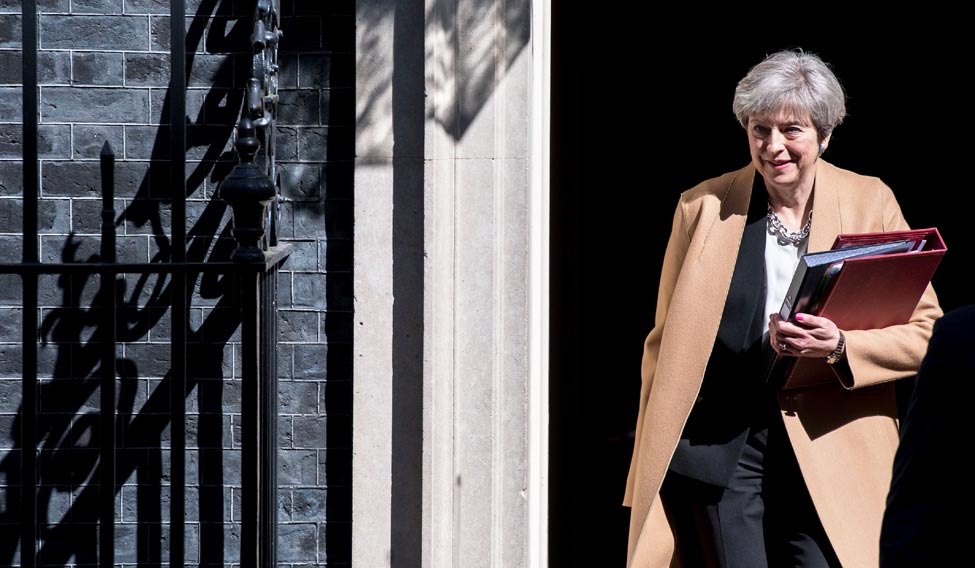British Prime Minister Theresa May’s volte-face in summoning a snap general election has very little to do with some of the reasons publicly outlined by her, namely that the main opposition Labour party “has threatened to vote against the final agreement” with the European Union, “the Liberal Democrats have said they want to grind the business of government to a standstill”, “the Scottish National Party say they will vote against the legislation that formally repeals Britain’s membership of the European Union” and “un-elected members of the House of Lords have vowed to fight us every step of the way”.
Labour MPs are, in fact, deeply divided, SNP’s strength is restricted to Scotland and the Lib Dems simply do not possess the numbers. In other words, if May’s Conservative party is united—it is enjoying an absolute majority—it can easily see off the challenges.
Fundamentally, the British electorate voted to exit the EU to clamp down on immigration and recapture sovereignty. Therefore, it would be a travesty of democracy, if the mother of parliaments was to dishonour this verdict.
The truth is, May’s party is split three ways on what kind of Brexit it wants, thereby lending her an awkward mixed mandate to negotiate with Brussels. The ultra-nationalist rump of MPs on the right is insistent on severing all links with the EU regardless of the consequences. May’s position is to secure the best possible deal in the circumstances, including continuing free trade with the remaining 27 member countries of the union, even if this means compromising in certain areas.
Models adopted by Norway and Switzerland give them tariff-less access to the common market without being a member of the EU. Whichever way it evolves, Britain’s immigration policy will harden.
A recent survey conducted by YouGov put the Conservatives 21 percentage points ahead of the Labour. Under left-wing leader Jeremy Corbyn, the party is in utter disarray.
Even if viewpoints narrow—and Labour will fight the elections on working class issues like continuing austerity, low salaries and the cash crunch in the health service—and Europhiles flock to the Lib Dems, as of now, May could significantly increase her majority in the House of Commons. This would minimise the bargaining power of her colleagues who demand a potentially damaging hard Brexit.
Needless to mention, Labour could be reduced to its worst performance in nearly a century. Even if it thereafter reunifies under a new leader, its numbers are unlikely to bother May. She would be guaranteed an easy ride for the next five years.
David Cameron was the most pro-India British prime minister ever. May continues more or less in the same vein for practical reasons. The United Kingdom desires an expansion on trade and investment with India to off-set any future diminution in turnover with the EU. In the past six months, May and every senior British cabinet minister have made Delhi a port of call. At the same time, India’s expectation of freer entry of Indian workers into the UK is unlikely to be met.
There are presently 10 sitting MPs of Indian descent in the Commons. None of these seem to be in any great danger of losing their seats. Only the Labour candidates have anything to worry about, given Corbyn’s unpopularity. But Virendra Sharma, Keith Vaz, Seema Malhotra and Lisa Nandy enjoy comfortable majorities. Only Vaz’s sister Valerie may have a fight on her hands.
Politicians of Indian extraction in Britain have noticeably progressed of late. Priti Patel commands cabinet rank. She and other Conservative MPs of Indian origin shouldn’t face much difficulty in retaining their seats.
Ashis Ray is the longest serving Indian foreign correspondent, having worked uninterruptedly in this capacity for 40 years, mainly for BBC and CNN. He is president of Indian Journalists' Association in Europe.
(Disclaimer: The views expressed in this article are solely those of the author and do not necessarily represent the views of the publication.)




